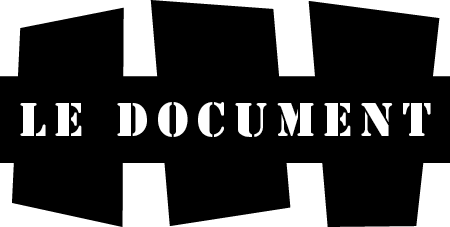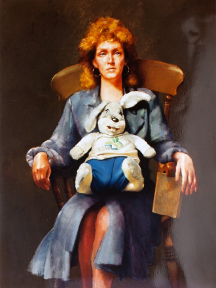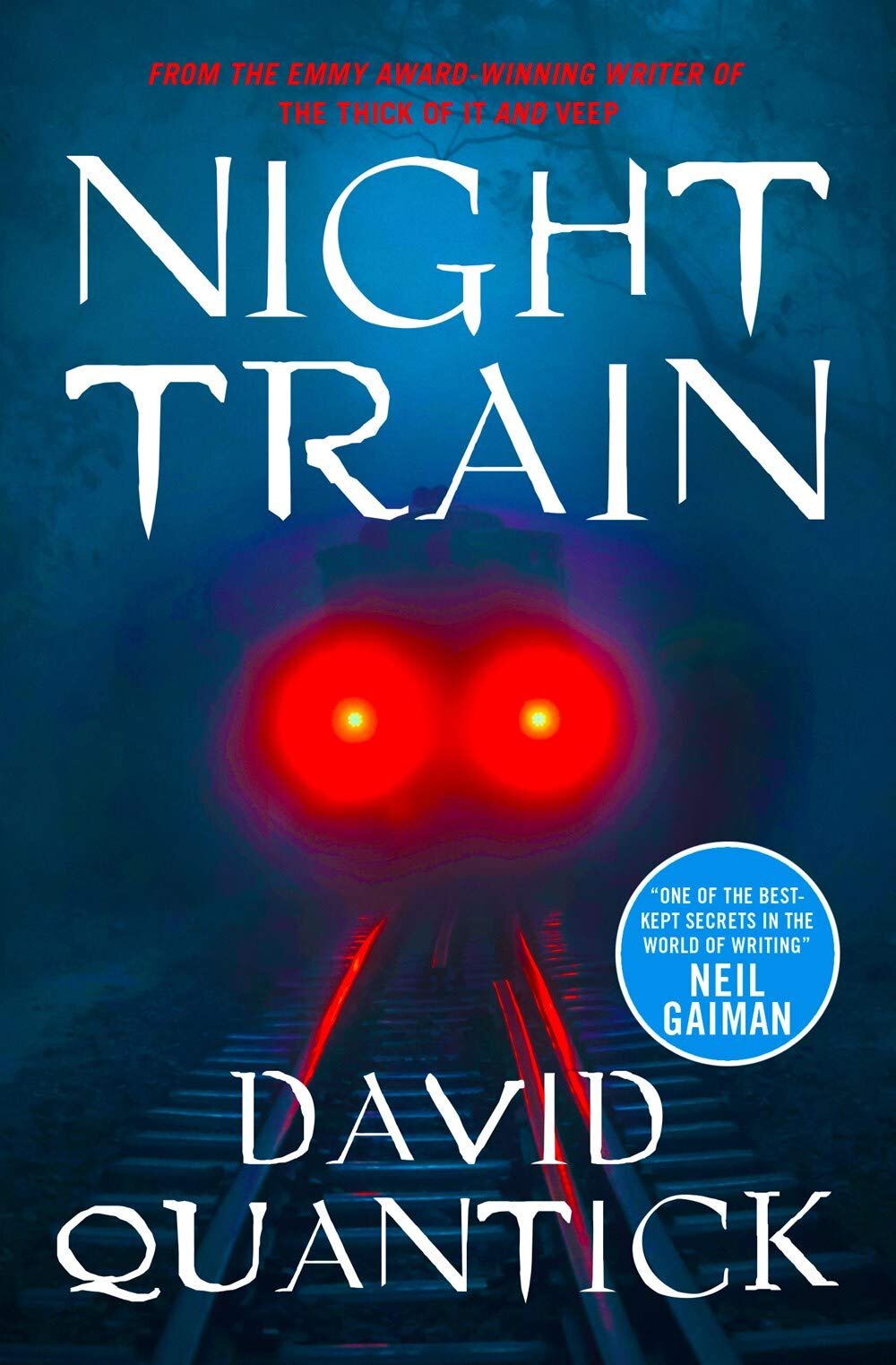David Quantick
David Quantick is a best selling author, award winning television writer and NME legend. Le Document were delighted when David agreed to answer 12 questions from Harry Pye. Now read on...
Harry Pye
I read you were born in South Yorkshire but brought up in Devon. I've never been to Devon but I know it's considered a beauty spot. Do you have happy memories of Devon and are there certain parts of it that you'd recommend people visit?
David Quantick
Devon is doilies and tearooms in the East, surfers and rocks in the North, and pirates and artists in the South. I spent my early childhood in Plymouth which is a great place. It used to be a borough county in its own right, neither Devon nor Cornwall, and it’s wild, full of divers, sailors and geniuses. Nearby is Dartmoor, which is both sexy and bleak, and contains china clay works, which are like the Moon only convenient. This painting sums up Devon for me: it’s local TV legends Judy Spiers and Gus Honeybun, painted by Robert Lenkiewicz.
Judy Spiers and Gus Honeybun, painted by Robert Lenkiewicz
For one year you were at The University College London Law Faculty the same time as Lloyd Cole. When you were students did you become Brand New Friends and enjoy Lost Weekends together? And have you enjoyed his recent work? Some say his first album was his masterpiece others say his last few albums are amongst his best — what say you?
Lloyd was the first cool person I ever met. He wore rollneck sweaters and girls went mad for him. When he became a pop star I was somewhat taken aback to realise it was Lloyd from college. I love his work, especially his recent electronic recordings and the fantastic Guesswork album. I go and see him play most times he’s in Britain – he’s a very dry live performer, like a laconic Bruce Springsteen with better songs.
I first became aware of you when you worked for the NME and was always a fan. Which NME journalists have a place in your heart? Could you give me a personal Top 5 list of your all-time favourite NME journalists of all time?
I was overawed by meeting the likes of Adrian Thrills and Andy Gill when I started writing for the NME in the 1980s. My teen idols had gone but I have come to meet most of them on the internet. And I worked with a lot of brilliant writers for a long time.
A top five might be:
Julie Burchill – the funniest, brightest writer I ever met.
Charles Shaar Murray – everything great about rock journalism in every sentence he writes.
Ian Penman – original thinker, fantastic writer and lovely man.
Steven Wells – I miss him a great deal.
Cath Carroll – sharp and intriguing and a lovely person.
I remember a harsh (but fair) Transvision Vamp review you wrote for Q that made me laugh out loud. Do you think music journalists now find it hard to really say what they feel about a bad album because they know how hard it is to make a living from music? Is it much harder to be witty when writing about a great album?
I don’t remember writing about them. I don’t know how younger music writers write about music, I’m just glad they do. I wish there was a worldwide ban on writing about records made more than ten years ago, though. It’s stupid living in a world where Neil Young and the Beatles get more coverage than new artists. Stop it! It’s only hard to be witty when you’re not good at being witty. The slag-off is a weary rock writer cliché. Like the bits in Downton Abbey when Maggie Smith’s character says something biting. Everyone goes, whoah that was witty, and it’s always rubbish. Good writers can praise things in an original manner and be critical in an exciting way.
Armando Iannucci O.B.E contacted you and asked you to write for the Radio Show he was producing, On The Hour because he liked what you wrote in the NME. Did getting a letter from him seem like a big deal at the time?
Armando liked a column in the NME Steven Wells and I wrote – that particular one was about classical music. I still have that letter, so it must have been. Steven and I had no idea who he was or any of the performers or writers. I remember thinking that I was the most talented person there, in a room with Armando, Peter Baynham, Steve Coogan, Stewart Lee and Richard Herring, Patrick Marber, Chris Morris and David Schneider. I was wrong. I was immensely lucky to write with Steven for On The Hour and The Day Today, and then with Jane Bussmann on Jam and Brass Eye and Armistice. And more than lucky to write on Veep, The Thick Of It and Avenue 5. I always thought I was mostly composed of fat and gristle, but it seems I am in fact made entirely of luck.”
Are there any sketches you wrote for On The Hour and The Day Today that you're particularly proud of, or that never fail to make you laugh?
Swells and I wrote “cup of tea” for On The Hour and “cat on a shelf” for the War! bit of The Day Today and I can’t remember anything else.
There was a time when Harry Hill's T.V. Burp was the number one comedy show with 8 million people tuning in. It felt like it was a hit with people regardless of their age or background. When you were part of the writing team for this show was it the first time your family really clicked with your work? Or did you have the type of family who would always listen to On The Hour and buy the music magazines you contributed to?
My agent once told me that all the Chris Morris stuff meant people thought I was a “dark” writer, so writing for Harry sort of reduced that perception slightly. Harry’s brother lives in Devon, so my Dad liked that.
There was once talk of you collaborating with Mike Batt on a musical version of Reggie Perrin. Did Mike write any music for it / did you write a rough script etc? Will it ever happen?
Mike wrote a whole heap of astonishing songs for Reggie Perrin which went perfectly with the script Jonathan Coe and I adapted from David Nobbs’ work. He did doubly well considering he’d missed the TV series at the time, as he was too busy being famous. It’s a great musical, funny, catchy and poignant and maybe when we have theatres again it will rise up.
Your novel, All My Colours has been very well received. Every single review mentions Franz Kafka. Which novelists have influenced your way of writing? And who are your writing heroes?
Franz Kafka! Nice. He is brilliant, but I was trying to write a Richard Bachman novel – something like Thinner, where one awful thing just gets worse and worse until something terrible happens. I used to want to be Kingsley Amis. Then I wanted to write like Jonathan Coe. This week it’s Jonathan Carroll. I would give it all up to write like Joan Aiken, though.
Your new novel is called, Night Train. What's it about and what inspired you to write it?
It’s about a woman waking up in a dark, loud room that’s shaking crazily, then realising she’s on a train. She opens a door into a compartment full of corpses. It goes on from there, really. I had that initial idea of the woman in the crazy room and the rest of it is about what happens next. Then I had a dream about skiing, so that went in. And so on. It’s got more jokes than I expected, which I hope is a good thing. Horror and comedy are two sides of the same coin.
Are you optimistic about the future of this country? What do you feel positive about?
I’m a very optimistic person. We’re told every week that it’s the end of history or the end of this or that, but here we still are. It’s like, the dinosaurs were hit by a huge meteorite that covered the world in suffocating dust for a year, and they’re still here, right? Right?
Night Train is published by Titan Books on August 25.





